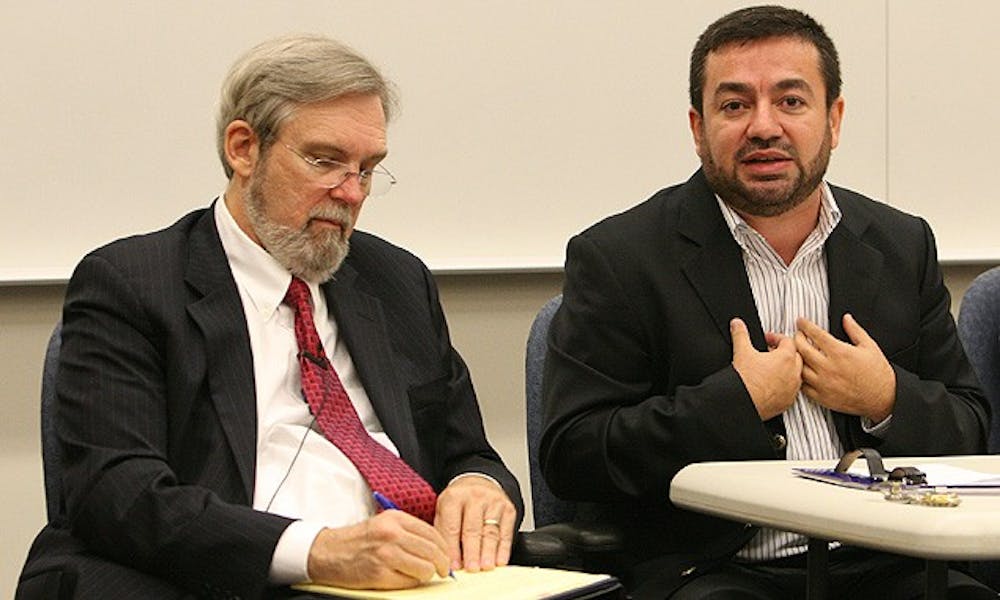Faith groups at Duke are joining hands to commemorate the 10th anniversary of Sept. 11.
The Duke Divinity School and the Faith Council hosted a panel discussion Wednesday to discuss the topic of faith communities and their responses to the terrorist attacks in 2001. Dean of the Duke Divinity School Richard Hays introduced the speakers—Muslim Chaplain Abdullah Antepli, Buddhist Chaplain Sumi Kim, Assistant Director of Jewish Studies Laura Lieber and Dean of the Duke Chapel Sam Wells. The speakers vocalized hopes for future interfaith unity.
“This is an opportunity for us to come together and reflect on the differing—and hopefully sometimes convergent—ways religion addresses a matter of great public importance and common concern to us all,” Hays said.
He added that although many people say religion fosters violence, he believes that religion is merely the instrument that humans use to inflict violence upon one another.
“Jewish communities often take measures in Israel against this kind of violence, and we did the same here,” Lieber said. “We had to increase security against places visibly and identifiably Jewish.”
Lieber noted that Judaism has something to contribute—the concept of memorializing an event without remaining in grief from it.
Kim mentioned that the grief resulting from 9/11 could justifiably result in anger—a natural response—but said Buddhism warns against allowing the anger to fester into hatred.
She encouraged tolerance and acceptance and ended her contribution with a Buddhist recitation titled “May I Know Peace.” The message, she said, was that there are a variety of parties involved and affected by the attacks, but they must come together to find peace.
“If Jews and Christians can learn about healing and respect from one another, then I hope the circle can be ever widened,” Lieber said.
Wells warned against allowing already existing narratives and prejudices to shape the way we reflect on the event.
“The fact that we’re having this kind of conversation 10 years later indicates that the event was simply too complex to fit in one agreed narrative,” he said.
Wells added that he theologically did not agree with the aggressive manner in which the United States responded to the attacks. He called Sept. 12 the saddest day in modern history.
“It was an opportunity for America to show what it was really made of, and it came out with all guns blazing,” Wells said.
Antepli said it is human nature to respond to differences violently. He noted that in Saudi Arabia, Christians who are drawn in for their skills and resources cannot practice their religion within their own homes.
He also spoke about the challenges facing the Muslim population in a post-9/11 America and the negative feelings they felt coming from a place they considered home.
“Muslim doctors, policemen and firemen were arrested and sometimes deported when they tried to rescue people,” Antepli said. “They thought we were trying to finish the job of a few crazy members of our society.”
Wells added that Americans and Christians both have to reinvent their relationship with Islam.
“The idea that a war can be conducted against a specific group of people to eradicate all evil from the earth is theologically very flawed,” he said. “It is, however, a very practiced strategy in the last 10 years.”
Antepli said Muslims spent the years following 9/11 apologizing for a crime they did not commit. He noted that members of the Islamic population had to adjust to 9/11 as propaganda, creating “the monster of Islam.” Not all Americans believe it, he said, but significant amounts do.
“Some people were changing their names as a self-defense system and others rejected the faith entirely,” Antepli said. “We are all grieving over lost dreams of integration that we thought we had already achieved.”
The speakers concurred that the forecast for the future remains hopeful and that interfaith unity will take time.
“Ten years is not a very long time in the life of nations, but I sit here before you in a sense of defeat,” Antepli said. “I think in another 10 years there will be a better story to tell.”
The audience—made up of students and faculty—was given the chance to approach the speakers with questions following the panel discussion. Many expressed the belief that the event was an important contribution to remembrance of Sept. 11.
“Personally, this panel helped me understand the complexities of what happened that day and the variety of people that were affected following the tragic events,” sophomore Hannah Ward said. “As an American Protestant Christian, my view was hardly global.”
Get The Chronicle straight to your inbox
Signup for our weekly newsletter. Cancel at any time.

